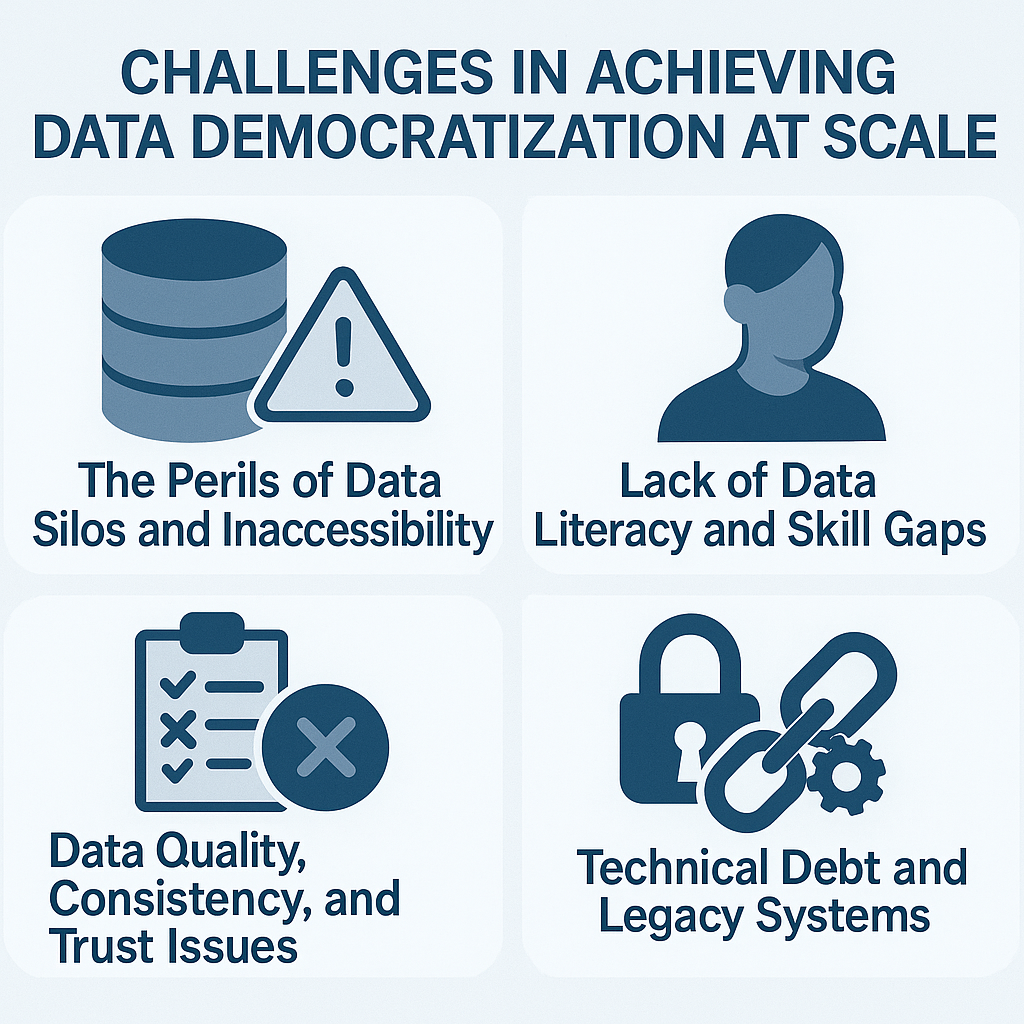
In the contemporary enterprise landscape, data is the new oil, unequivocally fueling innovation, driving efficiency, and unlocking unprecedented competitive advantages. However, for this fuel to truly propel an organization forward, it must be refined, made accessible, and understood by everyone who needs it. This is the essence of Data Democratization: making data available to the masses within an organization, not just a select few, enabling broader participation in data analysis and informed decision-making.
The promise of data democratization is compelling: a workforce empowered to leverage data for insights, leading to more agile responses, innovative solutions, and ultimately, a more intelligent enterprise. Imagine sales teams not waiting for reports but directly analyzing customer behavior, marketing crafting hyper-personalized campaigns based on real-time data, and operations optimizing processes by identifying bottlenecks directly from accessible metrics. This vision of pervasive data-driven decision-making is what every modern enterprise aspires to.
However, transforming this vision into reality within the intricate web of enterprise systems, diverse data sources, and organizational structures is a monumental undertaking. It demands a holistic approach to Enterprise Data Management, moving beyond traditional, centralized models to embrace a more distributed and accessible paradigm.
This blog post delves into the critical journey of achieving data democratization at scale within large organizations, exploring the multifaceted challenges and offering practical, actionable solutions in the realm of Enterprise Data Management.
Why is democratizing data so crucial for enterprises today?
While the benefits are clear, the path to widespread data democratization is fraught with significant hurdles. These challenges often stem from historical data architectures, ingrained organizational cultures, and the sheer complexity of modern enterprise environments.

Perhaps the most pervasive challenge is the prevalence of Breaking data silos. In many large organizations, data resides in disparate systems, departments, and applications, creating isolated islands of information. Customer data might be in CRM, sales data in an ERP, and marketing data in a separate analytics platform.
Even if data is made available, a significant portion of the workforce may lack the skills to effectively interpret, analyze, and apply it.
For data to be truly valuable, it must be accurate, consistent, and trustworthy. In large enterprises, maintaining high data quality across numerous systems is a continuous battle.
Democratizing data does not mean unrestricted access. Enterprises must navigate a complex web of regulatory requirements (e.g., GDPR, CCPA), industry standards, and internal security policies to protect sensitive information.
Clear data ownership and robust Data governance for democratization frameworks are essential. Without them, data quality deteriorates, definitions diverge, and accountability becomes elusive.
Many established enterprises operate with legacy systems and architectures that were not designed for the scale and flexibility required for modern data democratization initiatives.
Addressing these challenges requires a strategic, multi-pronged approach that combines technological innovation with cultural transformation.
The foundation of successful data democratization is a well-defined Enterprise data strategy. This strategy should outline the organization's vision for data, its role in achieving business objectives, and the roadmap for its implementation.
Moving away from fragmented data sources requires a robust and scalable Enterprise data architecture. This often involves embracing modern data platforms.
Robust Data governance for democratization is not a hindrance but an enabler. It provides the framework for ensuring data quality, security, and trust.
Making data available is only half the battle; ensuring users can leverage it is the other.
While central governance is crucial, the execution of data management can be increasingly Decentralized data management.
Ultimately, successful data democratization hinges on a cultural shift within the organization where data is valued, trusted, and used as a strategic asset.
Data Democratization at scale is not merely a technological initiative; it is a fundamental transformation in how enterprises operate. It empowers every employee to become a data advocate, driving innovation, enhancing efficiency, and fostering a culture of continuous learning. While the challenges are significant, by strategically investing in a robust Enterprise Data Management framework, embracing modern data architectures, prioritizing data governance, fostering data literacy, and cultivating a data-driven culture, organizations can unlock the immense potential of their data. The journey is complex, but the destination—a truly data-empowered enterprise—is well worth the endeavor. The future belongs to organizations that can not only collect data but can effectively democratize it, making it the bedrock of every decision and the catalyst for sustained success.
1. What is Data Democratization?
Data Democratization is the process of making data easily accessible and understandable to a wider audience within an organization, not just technical experts. The goal is to empower employees at all levels to make data-driven decisions, fostering innovation and efficiency across the enterprise. It involves providing the right tools, training, and governance to ensure data is used effectively and responsibly.
2. Why is Data Democratization important for enterprises?
It's crucial because it accelerates innovation, improves agility, and enhances decision-making at all levels. By allowing more employees to access and analyze relevant data, organizations can identify opportunities faster, respond to market changes more effectively, and foster a culture of evidence-based problem-solving, leading to a significant competitive advantage.
3. What are the biggest challenges in achieving Data Democratization?
Key challenges include overcoming data silos, ensuring data quality and trust, addressing data literacy gaps among employees, managing complex security and compliance requirements, and establishing clear data governance and ownership. Legacy systems and a lack of a comprehensive enterprise data strategy also pose significant hurdles to widespread data access and utilization.
4. How does data governance support Data Democratization?
Data governance is vital for successful data democratization by providing the framework for secure, ethical, and efficient data use. It defines data ownership, sets clear access policies, ensures data quality, and maintains compliance with regulations. Robust governance builds trust in the data, preventing misuse while ensuring that the right people have access to the right information at the right time.
5. What is the role of technology in Data Democratization?
Technology plays a foundational role by providing the platforms and tools necessary for data accessibility and analysis. This includes modern data architectures like data lakehouses, self-service business intelligence (BI) tools, data catalogs for metadata management, and robust security solutions. These technologies facilitate data discovery, visualization, and secure sharing, enabling non-technical users to engage with data effectively.